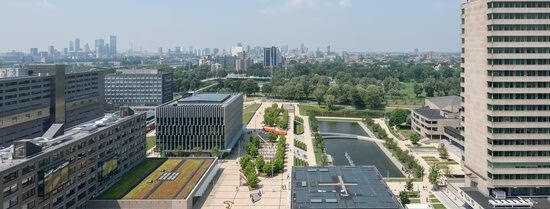Economics is not only about money. "That is what many people think, but economics is mainly about trade-offs", says Elisa de Weerd, PhD candidate at Erasmus School of Economics. This misconception was her main motivation to make a podcast about the diversity of economics: 'De Nieuwe Economen Podcast'. "Economists work on almost every social issue. From the wealth tax to how we can design healthcare better. I want to show that."
In two episodes, PhD candidates from our university will pass by. Can you tell us more about them?
"In one episode, we talk to EUR PhD candidate Marlies Bär. She researches the quality of the care provided by nursing homes in the Netherlands. How do we measure the quality of care? The costs have risen enormously in recent times. It is expected that in 2060 it will rise to €60 billion for elderly care alone. That is four times as high as in 2015. The big question is: has the quality of care kept up with the costs? To answer that question, we first need to know what quality actually is, and that is what Marlies is working on."
Ice hockey data on professional visibility
"Another interesting episode is with Sam Hoey, PhD candidate at Erasmus School of Economics and the Tinbergen Institute. He uses data from the North American ice hockey league to find out to what extent professional visibility influences later career opportunities.
In 'normal' jobs, such as an office job, it is difficult to measure how people behave at work and how they function in teams. Often you only have a performance review once a year. In ice hockey, you can see how someone has done every game. In this way, you can see what it means to suddenly be much more visible to your employer. This solves a data problem, as these kinds of issues are often difficult to answer in other fields of work."
Elisa de Weerd is doing her PhD at Erasmus School of Economics on research into 'risky health behaviours'
"Many people think of healthy behaviour as sufficient exercise, eating well and drinking little alcohol. But it is broader than that. For example, having safe sex, taking your prescribed medicine at the right time or wearing a face mask when you need to. In the evenings and weekends she works for the economic journal ESB. "We receive articles from policy makers and academics. As an editor, I read the articles, do the editing and prepare the article for publication. This keeps me well informed of new developments."
How did the podcast start?
"We make the podcast with the three of us: Yrla van de Ven, Sarah van Hugte and me. You often see the same economists in the news. There are often PhD candidates who do research on the same subjects and are even more into the economics literature. There are also many societal challenges that call for fresh perspectives and new ideas: from climate crisis to energy crisis. With the podcast, we especially want to let this new sound be heard."
"There is a perception that economists only think about money, but economists work on almost every social issue that comes up in politics"
Economics is more than money
"The second reason is a personal motivation for the podcast. I want to show that economics is very broad. There is an image that economists only think about money, but economists work on almost every social issue that comes up in politics. They can respond to that economically. For example, economists can say something about policy on child labour, the taxation of wealth and how a CO2 price can contribute to a better climate. I wanted to include the broad range of economic topics."
What have you learned from making and presenting a podcast?
"It was very exciting at the beginning, but it also felt natural. In the corridors you also ask colleagues what they are doing. Only now it is being recorded. Sam Hoey explained why sports economics is not only a fun, but also a useful field of study. At first glance, sport and economics seem like two completely different worlds. But sport turns out to provide economists with a goldmine of data with which they can conduct research. Not only into the sports industry itself but also into the labour market. I had never thought of that before. We also got better at making the podcast. Every episode went smoother. Hopefully we can make a second season."
- More information
The seven episodes of the first season are all online. A bonus episode will be published on 26 June. The episodes can all be listened to via Spotify, Apple Podcasts and other podcast apps. Read more on the podcast website here (in Dutch).

